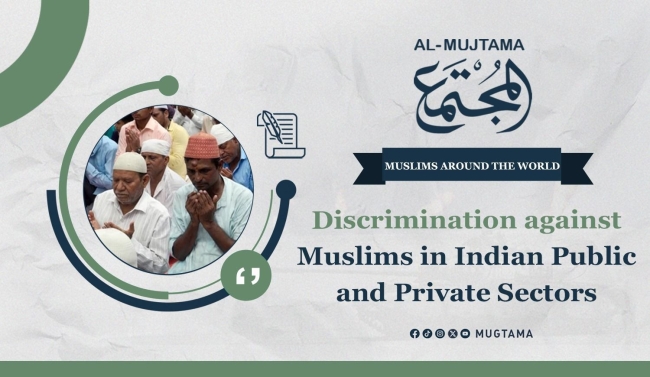Discrimination against Muslims in Indian Public and Private Sector
Discrimination against Muslims in employment, whether in the public or private sector, represents a growing problem faced by this group in many countries, including India. Despite constitutions and laws affirming equality and non-discrimination, Muslims often face significant obstacles that prevent them from obtaining equal job opportunities. This discrimination is evident through lower employment rates, ignored applications submitted by Muslims, and social and religious biases that affect their ability to achieve professional success.
This article highlights the discrimination against Muslims in jobs, examines its causes and effects, and suggests practical solutions to address it.
Recent research conducted by LedBy, a non-profit leadership incubator for Muslim women in India, reveals serious obstacles faced by Muslim women in the labor market. For the purpose of the study, two equally qualified resumes were created, one for a fictional Muslim woman named Habiba Ali and the other for a fictional Hindu woman named Priyanka Sharma. Neither profile contained a photo. Over ten months, 1,000 job applications were submitted from each profile to 1,000 online job sites such as LinkedIn and Naukri.
Out of the 1,000 applications submitted, Priyanka received 208 positive responses, while Habiba received only 103. Despite having similar qualifications, Habiba received less favorable results. Both women received 88 positive responses from the same institutions, but Priyanka received 120 unique responses from different institutions, while Habiba received only 15. Habiba rarely received follow-up calls, whereas a large proportion of Priyanka’s responses were in the form of follow-up calls. Recruiters proactively reached out to Priyanka on her online profile, while Habiba received only one positive response from recruiters who found her profile online, compared to Priyanka's 15.
Supporters of "Hindutva" and their allies in the Bharatiya Janata Party (BJP)-led government in India have called for an economic boycott of Muslim vendors, daily laborers, craftsmen, and other service providers. LedBy's research confirms that this anti-Muslim sentiment has extended into the private sector, where recruiters believe that Muslim women are less capable of performing jobs for which they are fully qualified.
Discrimination in Government Employment
Although the Indian Constitution, for example, guarantees equality before the law and prohibits discrimination based on religion or race, the reality is different. Muslims increasingly find themselves marginalized in many government jobs and are indirectly excluded due to arbitrary eligibility criteria, a lack of support networks, and ingrained societal biases.
Statistics indicate alarmingly low representation of Muslims in government jobs, both at higher levels and even in lower grades. Studies reveal that the percentage of Muslim employees in government departments does not correspond to their population proportion. Muslims are often rejected for employment due to their religious background, despite being qualified. This discrimination is not only a result of institutional policies but also of negative attitudes toward Muslims in the wider society.
Impact of Government Policies
Under governments promoting Hindu nationalist policies, such as the BJP in India, Muslims have been further marginalized in government hiring processes. Policies targeting Muslims, like "security vetting," increase discrimination. Additionally, public calls from some sectors for boycotts of Muslim workers in specific industries make it even harder for them to secure jobs.
Discrimination in the Private Sector
Numerous studies show that discrimination against Muslims in hiring is not limited to the public sector but also exists in the private sector. A study by LedBy in India revealed that Muslim women face significant discrimination in the labor market. For example, Muslims receive half the number of positive responses compared to their Hindu counterparts when applying for the same jobs with equal qualifications.
Muslims are often excluded from employment based on their names or physical appearance, such as wearing a hijab or beard. These factors are used as unofficial criteria for rejecting applicants, with the assumption that Muslims are less capable of adapting to corporate culture or that hiring them may negatively impact the company’s public image.
Causes of Discrimination Against Muslims in Employment
- Islamophobia and Social Biases:
The rise of Islamophobia in many societies contributes significantly to discrimination against Muslims in employment. Negative perceptions of Muslims, such as being less loyal to the state or more associated with violence and extremism, affect their job prospects. These biases influence hiring decisions, both in the public and private sectors. - Rising Nationalism and Discriminatory Policies:
In governments seeking to promote the dominant religious identity, policies are directed in ways that increase discrimination against Muslims. For example, calls for boycotting Muslim-owned businesses or questioning their national loyalty lead to their indirect exclusion from the market. - Lack of Support Networks and Equality:
Muslims often lack professional support networks that can help them access job opportunities. Many jobs rely on personal relationships and social networks, which may be unavailable or weak in Muslim communities. Additionally, policies aimed at promoting diversity and equality do not always fully include religious minorities.
Discrimination against Muslims in employment is a major challenge that needs to be addressed urgently and decisively. Through strengthening laws, raising awareness, and adopting inclusive hiring policies, a more just and diverse work environment can be achieved, providing equal opportunities for growth and success for everyone.
-------------------------------------------------------------


